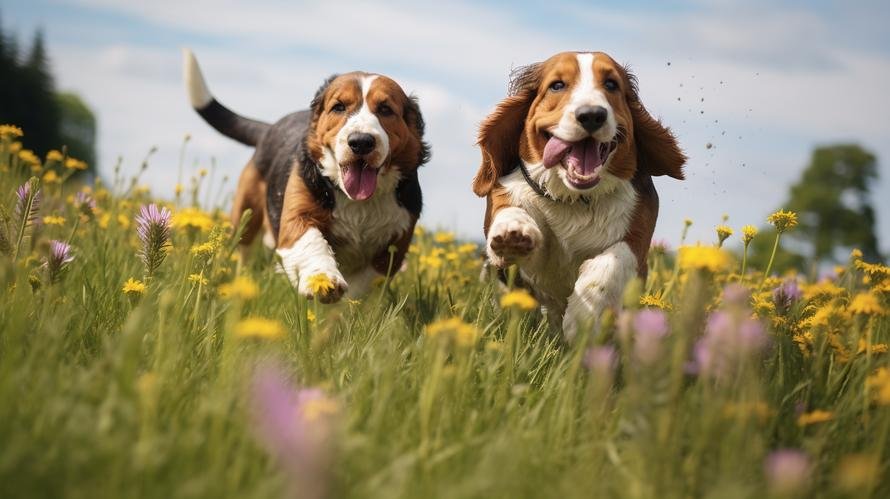Imagine a small, sturdy dog bounding through the dense underbrush of the Vendeen region in France, its keen nose to the ground as it tracks the scent of game. This isn’t just any dog; this is the spirited Petit Basset Griffon Vendeen, with a name as grand as the history it carries. Often affectionately dubbed as PBGVs, these pooches have charmed their way into the hearts of many with their shaggy beards and mischievous eyes. But as distinctive as their appearance is, their dietary needs require special attention that may surprise even the most seasoned dog enthusiasts.
PBGVs hail from a lineage bred for stamina and endurance, characteristics essential for the hunting of rabbits and hares. Despite their historical vigor in the field, in today’s domestic setting, they are more commonly found playing in backyards or snuggling on sofas. However, their nutritional requirements haven’t strayed far from their ancestors’. To maintain their enthusiasm and overall well-being, these dogs benefit from a balanced, nutrient-rich diet tailored to their unique needs.
It is widely acknowledged that the diet of a dog plays a pivotal role in their health, and the Petit Basset Griffon Vendeen is no exception. These sprightly canines possess a fast metabolism that, just like the engine of a racecar, requires premium fuel to run at peak performance. Therefore, one should consider dog food that supports their energetic lifestyle, yet corresponds to their moderate size.
High-quality animal protein should be at the heart of their diet. Chicken, lamb, fish, and beef provide the amino acids necessary for muscle development and repair. However, not all proteins are created equal. PBGVs do well on a diet that contains real, whole meat rather than by-product meals or meat ‘filler’ ingredients. This distinction is essential as it can be the difference between a glossy, vibrant coat and a lackluster one.
Carbohydrates provide the energy these dogs need but should be offered in the form of whole grains, vegetables, and fruits – not as processed grains or corn syrup that can lead to spikes and drastic drops in blood sugar. Foods rich in fiber, such as sweet potatoes and brown rice, will keep your PBGV’s digestive system running smoothly and help them feel fuller for longer, preventing overeating.
Essential fatty acids, namely Omega-3 and Omega-6, are critical in any dog’s diet, but for PBGV, they help maintain the skin health underneath their shaggy coat and support their cardiac functions. Fatty acids can be found in flaxseeds, fish oil, and some plant oils, which are often included in higher-end dog foods designed for optimal health.
When considering the PBGV’s diet, special attention must be given to their propensity for weight gain. These dogs may seem always ready for another treat or a heaping bowl of food, but they can quickly become overweight if their diet isn’t properly managed. Therefore, measuring meals and sticking to a feeding schedule is crucial. Treats should never account for more than 10% of their daily caloric intake; this is a rule of thumb that can help prevent obesity and its associated health problems.
One lesser-known fact about this breed is their susceptibility to certain food allergies and sensitivities. Common allergens include wheat, corn, soy, and sometimes beef or chicken. Symptoms can range from itchy skin and ear infections to digestive upset. Therefore, it’s wise to introduce new foods slowly and observe for any adverse reactions. Feed your PBGV a diet free from common allergens, and consider novel proteins like venison or duck, combined with hypoallergenic carbohydrates such as peas or chickpeas.
One may ponder whether to opt for dry kibble, canned food, or even homemade diets. The answer isn’t straightforward, as each PBGV may have its preference and its owner’s lifestyle to consider. However, kibble is generally well-accepted, convenient, and helps with tartar control on teeth. If opting for dry food, choosing one specially formulated for small or medium breeds will ensure the kibble size is appropriate for the PBGV’s distinct jaw.
Suppose you are leaning towards a homemade diet for your Petit Basset Griffon Vendeen. In that case, it’s essential to consult with a veterinary nutritionist to confirm that the diet meets all the necessary nutritional criteria. Home-cooked meals often need careful supplementation to be nutritionally complete.
Hydration is always an essential part of any dog’s diet, especially for an active breed like the PBGV. Clean, fresh water should be available at all times to support their kidney function and overall health. Hydration aids digestion, helps regulate body temperature, and is pivotal to every biological process.
In conclusion, while the Petit Basset Griffon Vendeen may not need a “special” dog food found at the end of a rainbow, they indeed require a diet formulated with care and consideration for their unique physical composition and energy requirements.oute.



